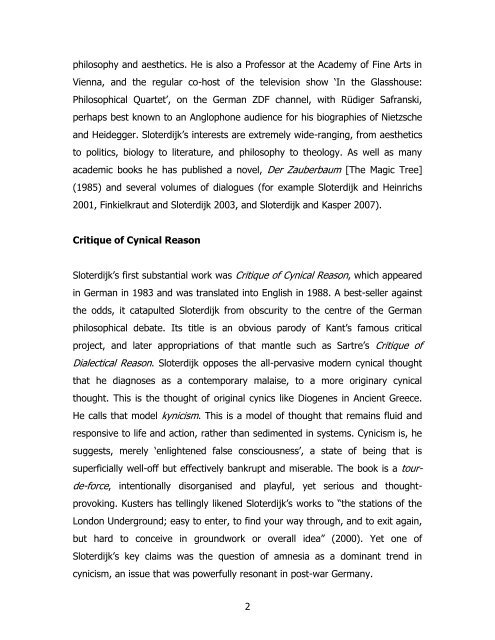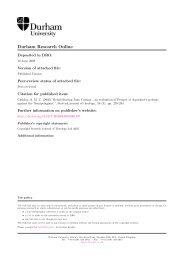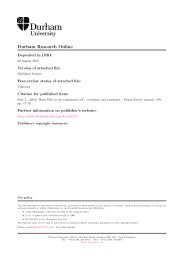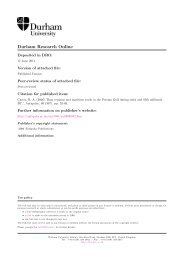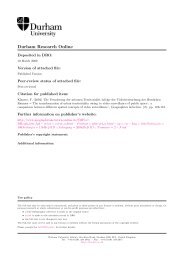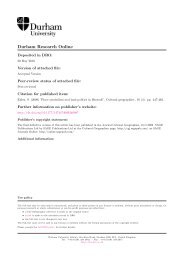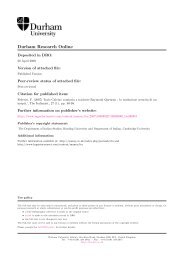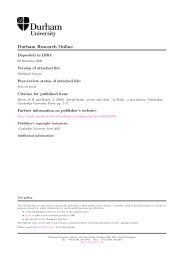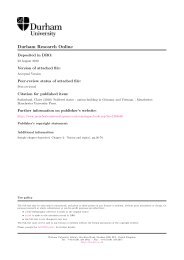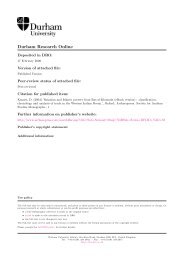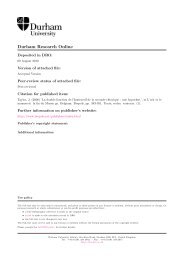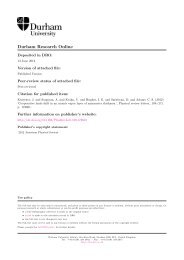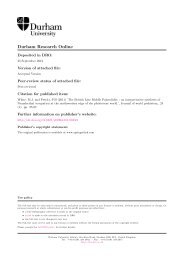Being-with as making worlds: the'second coming'of Peter Sloterdijk.
Being-with as making worlds: the'second coming'of Peter Sloterdijk.
Being-with as making worlds: the'second coming'of Peter Sloterdijk.
You also want an ePaper? Increase the reach of your titles
YUMPU automatically turns print PDFs into web optimized ePapers that Google loves.
philosophy and aesthetics. He is also a Professor at the Academy of Fine Arts in<br />
Vienna, and the regular co-host of the television show ‗In the Gl<strong>as</strong>shouse:<br />
Philosophical Quartet‘, on the German ZDF channel, <strong>with</strong> Rüdiger Safranski,<br />
perhaps best known to an Anglophone audience for his biographies of Nietzsche<br />
and Heidegger. <strong>Sloterdijk</strong>‘s interests are extremely wide-ranging, from aesthetics<br />
to politics, biology to literature, and philosophy to theology. As well <strong>as</strong> many<br />
academic books he h<strong>as</strong> published a novel, Der Zauberbaum [The Magic Tree]<br />
(1985) and several volumes of dialogues (for example <strong>Sloterdijk</strong> and Heinrichs<br />
2001, Finkielkraut and <strong>Sloterdijk</strong> 2003, and <strong>Sloterdijk</strong> and K<strong>as</strong>per 2007).<br />
Critique of Cynical Re<strong>as</strong>on<br />
<strong>Sloterdijk</strong>‘s first substantial work w<strong>as</strong> Critique of Cynical Re<strong>as</strong>on, which appeared<br />
in German in 1983 and w<strong>as</strong> translated into English in 1988. A best-seller against<br />
the odds, it catapulted <strong>Sloterdijk</strong> from obscurity to the centre of the German<br />
philosophical debate. Its title is an obvious parody of Kant‘s famous critical<br />
project, and later appropriations of that mantle such <strong>as</strong> Sartre‘s Critique of<br />
Dialectical Re<strong>as</strong>on. <strong>Sloterdijk</strong> opposes the all-perv<strong>as</strong>ive modern cynical thought<br />
that he diagnoses <strong>as</strong> a contemporary malaise, to a more originary cynical<br />
thought. This is the thought of original cynics like Diogenes in Ancient Greece.<br />
He calls that model kynicism. This is a model of thought that remains fluid and<br />
responsive to life and action, rather than sedimented in systems. Cynicism is, he<br />
suggests, merely ‗enlightened false consciousness‘, a state of being that is<br />
superficially well-off but effectively bankrupt and miserable. The book is a tourde-force,<br />
intentionally disorganised and playful, yet serious and thoughtprovoking.<br />
Kusters h<strong>as</strong> tellingly likened <strong>Sloterdijk</strong>‘s works to ―the stations of the<br />
London Underground; e<strong>as</strong>y to enter, to find your way through, and to exit again,<br />
but hard to conceive in groundwork or overall idea‖ (2000). Yet one of<br />
<strong>Sloterdijk</strong>‘s key claims w<strong>as</strong> the question of amnesia <strong>as</strong> a dominant trend in<br />
cynicism, an issue that w<strong>as</strong> powerfully resonant in post-war Germany.<br />
2


